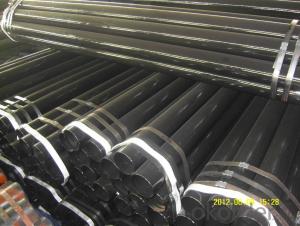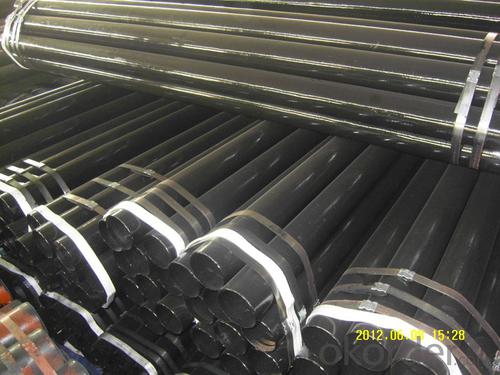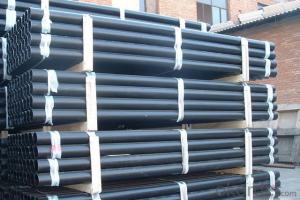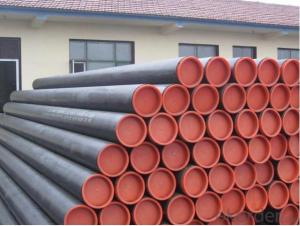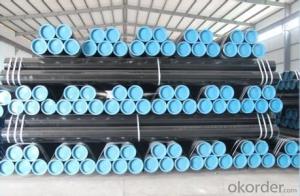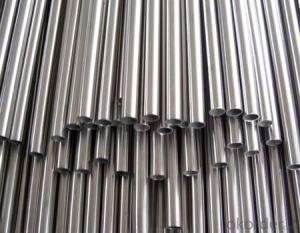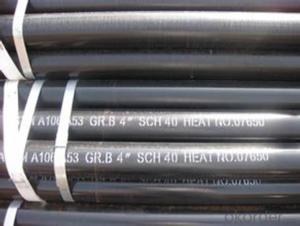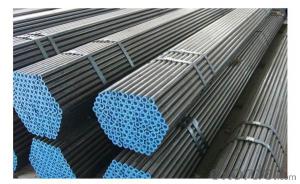Carbon seamless steel pipe A106Gr.B with high quality
- Loading Port:
- Tianjin
- Payment Terms:
- TT OR LC
- Min Order Qty:
- 50 m.t.
- Supply Capability:
- 10000 m.t./month
OKorder Service Pledge
Quality Product, Order Online Tracking, Timely Delivery
OKorder Financial Service
Credit Rating, Credit Services, Credit Purchasing
You Might Also Like
Quick Details
| Thickness: | 1 - 40 mm,1mm-40mm | Section Shape: | Round | Outer Diameter: | 1 - 813 mm |
| Place of Origin: | Tianjin China (Mainland) | Secondary Or Not: | Non-secondary | Application: | Boiler Pipe |
| Technique: | Cold Rolled | Certification: | CE | Surface Treatment: | Black Coated |
| Special Pipe: | EMT Pipe | Alloy Or Not: | Non-alloy | Type: | Seamless steel pipe |
| material: | A106Gr.B | Usage: | Boiler pipe | Chemical Compostion: | low carbon Steel Pipe |
| Grade: | 10#,20#,A53(A,B),A106(B,C),10#-45#,A53-A369 | Standard: | ASTM A106-2006,ASTM A53-2007,ASTM |
Packaging & Delivery
| Packaging Detail: | 1) in bundles 2Plastic Caps,Beveled ,or as the requirements of the customers 3) as the requirements of the customers |
| Delivery Detail: | Min within 10 days,or as the customer needs |
Specifications
Carbon Steel Pipe seamless steel pipe A106Gr.B
1)out diameter:6-820mm
2)thk:1-56mm
3)length: 5-6M 11.8M
- Q: How do you inspect steel pipes for defects?
- The inspection of steel pipes for defects requires a methodical approach that combines visual examination, non-destructive testing (NDT) techniques, and specialized equipment. The following are the typical steps undertaken to inspect steel pipes for defects: 1. Visual Examination: Commence by visually inspecting the external surface of the pipe, searching for any visible indications of defects, including cracks, dents, or corrosion. Particular attention should be given to welds, joints, and areas prone to stress or damage. 2. Ultrasonic Testing (UT): Ultrasonic testing is commonly employed to identify internal defects in steel pipes. This technique involves transmitting ultrasonic waves into the pipe and then interpreting the echoes received. Any irregularities in the internal structure, such as cracks or voids, can be identified and analyzed. 3. Magnetic Particle Inspection (MPI): MPI is a widely utilized technique for detecting defects on or near the surface, such as cracks, seams, or other discontinuities. This method involves applying a magnetic field to the pipe and subsequently applying ferromagnetic particles (usually iron-based) to the surface. These particles accumulate and form visible indications at areas where magnetic flux leakage is caused by defects. 4. Eddy Current Testing (ECT): Eddy current testing is suitable for detecting surface and near-surface defects in conductive materials like steel. This technique involves inducing an alternating current into the pipe and monitoring changes in the electrical currents induced by any present defects. These changes are then analyzed to identify and evaluate the defects. 5. Radiographic Testing (RT): Radiographic testing is conducted by exposing the steel pipe to X-rays or gamma rays and capturing radiographic images of the pipe. This technique allows for the detection of internal defects, such as cracks, porosity, inclusions, or variations in wall thickness. The radiographic images are subsequently examined for any indications of defects. 6. Dye Penetrant Inspection (DPI): DPI is a method used to identify defects on the surface of steel pipes. It involves applying a liquid dye to the surface, which penetrates into any surface cracks or flaws. After sufficient time for the dye to seep in and react, excess dye is removed, and a developer is applied to draw out the dye from the defects, rendering them visible. 7. Pressure Testing: Pressure testing entails pressurizing the steel pipe to a predetermined level and monitoring for any pressure drops or leaks. This test ensures that the pipe can withstand the required pressure without any structural defects. It is worth noting that the choice of inspection technique depends on various factors, such as the type of defect being sought, the size and characteristics of the pipe, and the specific industry standards and regulations. Inspection professionals with expertise in NDT methods and equipment are typically employed to ensure precise and dependable results.
- Q: How much is 4 inches steel tube MM?
- 1 inches =25.4 mm;4 inches =101.6 mm;The specification of steel pipe is usually nominal size;
- Q: What are the advantages of using steel pipes in construction projects?
- There are several advantages of using steel pipes in construction projects. Firstly, steel pipes are incredibly strong and durable, making them ideal for carrying heavy loads and withstanding harsh environmental conditions. Secondly, steel pipes have a high resistance to corrosion, which ensures a longer lifespan and reduces maintenance costs. Additionally, steel pipes are lightweight, making them easier to transport and install. Lastly, steel pipes are versatile and can be used for various applications such as water supply, sewage systems, gas pipelines, and structural support.
- Q: What is the difference between steel pipes and plastic pipes?
- The main difference between steel pipes and plastic pipes lies in their material composition. Steel pipes are made from a durable and strong metal alloy, while plastic pipes are composed of various types of plastic polymers. This difference in materials leads to variations in their properties and usage. Steel pipes are known for their high strength, resistance to extreme temperatures and pressures, and longevity, making them suitable for applications requiring robustness, such as in industrial settings or underground pipelines. On the other hand, plastic pipes are lightweight, flexible, and corrosion-resistant, making them ideal for plumbing, irrigation, and other non-industrial applications. Additionally, plastic pipes are easier to install and handle due to their lighter weight and flexibility compared to steel pipes.
- Q: Difference between seamless steel pipe and welded pipe
- Welded steel pipe for different welding process and divided into the furnace pipe welding (ERW) pipe and automatic arc welding, because of the different forms of welding seam welded pipe and spiral welded pipe is divided into two kinds, end its shape is divided into circular welded and shaped (square) pipe etc..
- Q: What are the factors to consider when selecting pipe materials for high-temperature applications?
- When selecting pipe materials for high-temperature applications, there are several factors that need to be taken into consideration. Firstly, the material's thermal conductivity is crucial. High-temperature applications require materials with high thermal conductivity to ensure efficient heat transfer and prevent heat buildup. Materials such as copper and stainless steel have excellent thermal conductivity and are commonly used in high-temperature pipe installations. Secondly, the material's resistance to thermal expansion is important. When exposed to high temperatures, pipes tend to expand. Therefore, it is crucial to choose materials with low thermal expansion coefficients to prevent deformation and potential pipe failure. Materials like carbon steel and stainless steel exhibit relatively low thermal expansion and are suitable for high-temperature applications. Thirdly, the material's mechanical strength and resistance to corrosion need to be considered. High temperatures can cause certain materials to weaken or corrode, leading to structural failures. It is essential to select materials that can withstand high temperatures without compromising their mechanical strength or corroding easily. Materials like alloy steel and nickel-based alloys are known for their high strength and resistance to corrosion, making them suitable for high-temperature applications. Furthermore, the material's cost and availability should be taken into account. Some high-temperature pipe materials may be expensive or difficult to obtain, which can impact the overall project budget and timeline. It is essential to balance the desired material properties with the project's financial and logistical constraints. Lastly, the specific application requirements and industry standards should be considered. Different industries may have specific guidelines or regulations regarding pipe materials for high-temperature applications. It is crucial to ensure that the selected materials comply with these standards to ensure safety, reliability, and compliance with industry regulations. In conclusion, the factors to consider when selecting pipe materials for high-temperature applications include thermal conductivity, resistance to thermal expansion, mechanical strength, resistance to corrosion, cost and availability, and compliance with industry standards. By carefully evaluating these factors, one can choose the most suitable pipe material to ensure efficient and reliable operation in high-temperature environments.
- Q: What are the different types of steel pipe supports?
- Some different types of steel pipe supports include pipe hangers, pipe clamps, pipe straps, and pipe saddles. These supports are used to secure and stabilize pipes in various applications, ensuring their proper alignment and preventing sagging or movement.
- Q: Can steel pipes be used for conveying solid materials?
- Yes, steel pipes can be used for conveying solid materials. Steel pipes are commonly used in industries such as construction, oil and gas, and mining to transport solid materials such as ores, coal, grains, and various other solid substances. The durability and strength of steel make it suitable for handling the weight and pressure of solid materials during transportation.
- Q: What are the safety considerations while handling steel pipes?
- When handling steel pipes, some key safety considerations include wearing appropriate personal protective equipment (PPE) such as gloves, safety glasses, and steel-toe boots to protect against potential injuries. It is important to be cautious of the weight and size of the pipes, using proper lifting techniques and equipment to prevent strains or accidents. Additionally, workers should be mindful of the sharp edges and potential for cuts or punctures, ensuring they have a clear and organized workspace to minimize the risk of tripping or falling. Regular inspections of the pipes for any damages or defects are also crucial to prevent accidents and maintain a safe working environment.
- Q: How can seamless steel tubes be produced?
- After extrusion to remove pipe sizing. The sizing machine passes through the cone bit and rotates into the steel embryo at high speed to form a steel tube. The inner diameter of the steel pipe is determined by the outside diameter and length of the sizing machine. When the steel tube is fixed, it enters the cooling tower and is cooled by spraying water. The steel tube is straightened after cooling. After straightening, the steel pipe is sent to the metal flaw detector (or water pressure experiment) by the conveyor belt for internal inspection. If there are cracks in the steel pipe, bubbles and other problems will be detected. Steel pipe quality inspection, but also through strict manual selection. After the quality inspection of the steel pipe, spray with the paint on the number, specifications, production batch number and so on. The crane is hoisted into the warehouse.
Send your message to us
Carbon seamless steel pipe A106Gr.B with high quality
- Loading Port:
- Tianjin
- Payment Terms:
- TT OR LC
- Min Order Qty:
- 50 m.t.
- Supply Capability:
- 10000 m.t./month
OKorder Service Pledge
Quality Product, Order Online Tracking, Timely Delivery
OKorder Financial Service
Credit Rating, Credit Services, Credit Purchasing
Similar products
Hot products
Hot Searches
Related keywords
